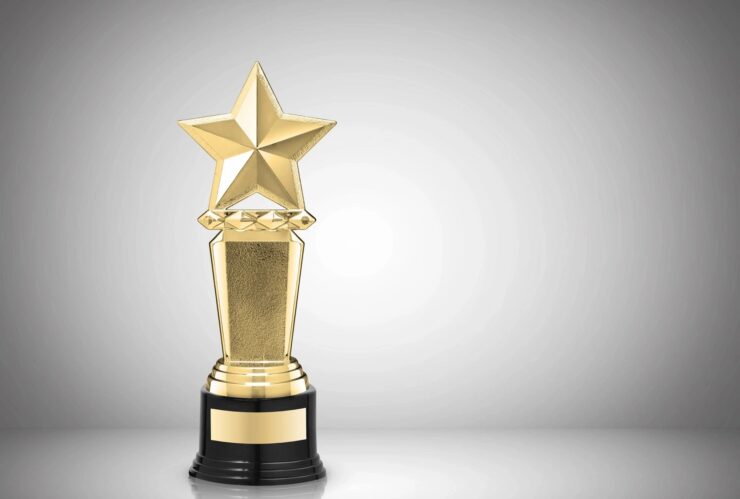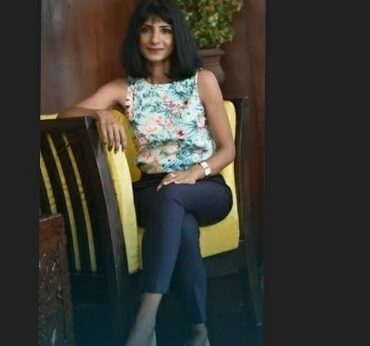
By Ambika Raja
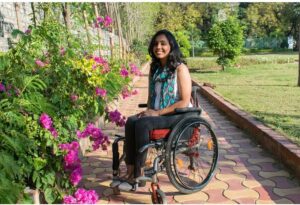
I was brought up in a suburban area called Chathamangalam, in Kozhikode. My mother was an English teacher, my father a marketing consultant and I have an older sister who is a chemical engineer. It would be wrong of me to say that I did not have a fairly smooth upbringing, as I had access to quality education and great opportunities, a loving family, and a supportive set of friends and teachers.
Right from when I was in school, I had an inclination towards reading and writing. While I mostly indulged myself with novels and short-story collections I borrowed from the school library, I also enjoyed reading human-interest stories in newspapers. At that time, I had no clue those articles were called human-interest ones. They clearly sparked my interest though. I was awed by how beautifully yet informatively the articles were written. More than that, I was moved by the stories themselves; moved by the tales of people, places, and emotions they contained. I used to imagine travelling around the globe, interacting with new people and understanding the issues they face, learning diverse cultures, and being able to write about all of it. Just like the best reporting I had read in the papers.
Those days, most students around me were opting for engineering or medicine after school. So, when I informed everyone that my plan was to do my Bachelor’s in English, then study journalism, and eventually work in the media field, I was met with rather mixed responses. While my parents were supportive of my decision, several others said that the “wise” choice was to pursue a career in science. I was not swayed by these remarks. After class XII, I went to Madras Christian College in Chennai to pursue a BA in English Language and Literature. Alongside, I registered for a long-distance course on Journalism and Mass Communication under Madurai Kamaraj University.
The Accident and its Aftermath
In November 2014, when I was 19 and in the second year of my undergraduate studies, I met with an accident that completely changed the course of my life. It resulted in a spinal cord injury and a condition known as paraplegia, which, in simple terms, is a form of paralysis wherein the affected loses the ability to walk. I have been a wheelchair user since then. I underwent surgery immediately after the accident and then rehabilitation at Christian Medical College, Vellore for two months after that.
Since my exams were in December, I had to drop my long-distance course in journalism.
I returned to Madras Christian College in February. My parents and my friends’ help was invaluable during this time. My parents shifted to Chennai to help me. My friends would help me move around the campus and would even drop me home after class. We set up a portable ramp at the entrance of the classroom. During this period, I also began reconsidering my career choices. I wondered if it would ever be possible to work as a journalist the way I had envisioned. Working as a news reporter implied being constantly mobile and active. It also meant being able to travel to any place at any hour of the day. While I already was an active person and the wheelchair did aid my mobility, what bothered me was that travel was a crucial part of a journalistic career. Within three to four months of the accident, I had realized that a majority of the buildings and public spaces in Chennai and elsewhere were not designed for PWDs (person with disabilities). They lacked basic facilities such as ramps and lifts. Moreover, almost all public transport vehicles were inaccessible for wheelchair users. How was I supposed to work as a news reporter, if I could not access most buildings or modes of transport?
Nevertheless, I did not want to give up on my dream and embark on some whole new and alien career. I kept reminding myself of one of the first lessons that I was taught during my rehabilitation period — being in a wheelchair will not stop me from doing anything that I want to.
I met and spoke to a few journalists who suggested that while it would be difficult (but not impossible) to work as a news reporter with my condition, I still had the option of working at an editorial desk and occasionally pitching stories. That sounded like a feasible option.
So after finishing my BA, I received admission at the Asian College of Journalism (ACJ) in Chennai for a 10-month long postgraduate diploma course with a specialization in Print Journalism. My professors at the institute were extremely considerate and ensured that I was treated as an equal to my peers.
Life as a Journalist with a Disability
In May 2017, I joined the Deccan Chronicle newspaper as a trainee sub-editor, in their Chennai office, where I worked for three months. Since it was a desk job and did not require much mobility, I was able to handle the job and the night shift without any major difficulties.
Around then, due to certain personal issues and financial constraints, I had to return to my home in Kerala and find a job in my hometown. A position for a reporter opened up at the New Indian Express office in Kozhikode. When I was hired, I was extremely worried and doubtful if I would be able to do justice to the work. As a journalism student, I had mostly travelled along with my peers for my reporting assignments and they had helped me if I faced any difficulty. At work, I’d be completely on my own while reporting. I would have to find my own means of travel. My family was also concerned about my safety.
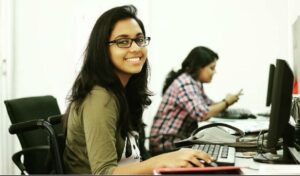
Nevertheless, in August 2017 I joined the New Indian Express office as a reporter on the education beat. My bureau chief and co-workers were quite understanding and helpful throughout my tenure at the office. And thankfully within the first week of joining, I was able to arrange a taxi for the commutes required for reporting. Occasionally, I also travelled by an auto run by a trustworthy acquaintance. Though the issue regarding travel had been resolved, in the initial few months, I struggled to build contacts and sources required for my articles.
Once I settled in with my routine at my office and had built my network of contacts for my articles, I was able to actually enjoy my work and complete it within the prescribed deadlines. I was also assigned to pitch in human interest stories for the weekly supplements of the newspaper, an opportunity I had been eagerly looking forward to since I first started reading newspapers!
Lack of infrastructure and lack of awareness
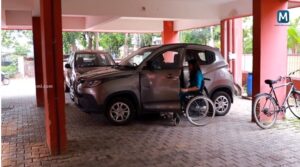
Every time I visited a place, covered an event, or took an interview, I had to call the concerned people beforehand and ask them if the place was wheelchair-friendly. Mostly they were not. They lacked ramps and lift facilities. A flight of stairs or rough terrain would make a whole interview near impossible. I found that while many of the newer buildings did make an effort to follow the accessibility rules, the existing ones (including government offices) lacked these basic amenities. Neither did they seem to have any intention to make any infrastructural modifications to accommodate PWDs. I somehow managed to get my work done either by asking someone to assist me up a flight of stairs if there were any or by finding other solutions. For reporting assignments where I did not have the option of making a call beforehand, I just went with my fingers crossed, hoping I’d be able to find some solution upon reaching the place. Luckily, in almost all the cases, the odds were in my favour.
Along with accessibility and travel, another issue I had to deal with was the approach of people. While some people I had to interact with encouraged me to continue in the field, others suggested it would be better if I didn’t work at all as I seemed to hail from a “well-off family” and could depend on my parents for financial needs. Additionally, even in situations where I did not require any help, people assumed I required assistance and used to push my wheelchair without even asking for consent. Let me just say here, people must ask for permission before attempting to help a PwD in any way. Ask first, always.
Though our country has improved significantly in terms of the opportunities and facilities provided for PwDs, I believe that we still have a long way to go. There are rules and laws, undoubtedly, to protect and empower Persons with Disabilities; yet their implementation does not seem to taking place in several parts of the country, including major cities. For a holistic empowerment of PwDs, I believe that infrastructural accessibility should be first ensured in all public buildings, education institutions and transport vehicles without which it would be extremely difficult for Persons with Disabilities to advance any aspect of their livelihood.
Accessibility also entails washrooms/bathrooms specifically designed for PwDs. Along with this, proper training and support should be given to both PwDs and their close ones/caretakers to help them navigate their issues and enable to have a better living.
During my work as an Education reporter, I learned that there are several students with disabilities in Kerala who are enrolled in schools, yet unable to physically attend the classes either due to their physical disabilities, or due to lack of transportation from the remote areas they come from. There are projects such as Vamozhi for children with learning disabilities, and Changathikoottam, an initiative of the Samagra Shiksha Kerala (SSA), which is helping children with special needs in the State attend regular schools at least once a week. Projects like these attempt to help students interact with their peers as well as make virtual classes possible for them to attend (these initiatives had commenced prior to Covid-19), but it would be extremely beneficial for these students with disabilities if accessible means of transport are arranged for them to physically attend schools. It will also help the other students learn about inclusivity and its necessity.
I was extremely lucky that through my childhood, my parents ensured that both my sister and I learnt to be independent, which in turn helped me a lot in my profession as journalist as well in my daily life as a PWD. I acknowledge that since I had easy access to good education and opportunities right from my childhood, I was able to have a career as a journalist with a disability. However, there are many PwDs out there who are keenly interested in the field of journalism, but lack access to education and face severe discrimination at every stage of their life. I sincerely hope that in the upcoming years, more PwDs are encouraged to take up this field through opportunities including special recruitment drives, training, and internship programmes.
The Future
I quit The New Indian Express to do my masters. I am currently pursuing my Master’s in English Literature via distance education. I am also freelancing as much as possible.
NWMI Fellowship
Sometime in January 2018, when one of my former colleagues at the New Indian Express introduced me to the Network of Women in Media, India (NWMI) website and encouraged me to apply for the organization’s yearly fellowship for women journalists, I had my reservations. I wasn’t sure if I was qualified or experienced enough to apply, let alone win a prestigious fellowship that aimed at uplifting women journalists working under adverse conditions. Evidently, you could imagine the surprise I had when Vasanthi Hariprakash, one of the members of the NWMI community rang me up two months down the line to inform me that I had been selected for the award. I was excited and thrilled beyond measure to realize that my work hitherto as a disabled journalist was being recognized on a bigger platform.
The NWMI Fellowship opened several doors for me. More than the financial assistance I was given, I got the chance to interact with several leading women journalists hailing from different parts of the country. I was able to follow their work and learn how I could improve my own news articles. I was also able to take part in a couple of international events, after being awarded the fellowship. I also got a chance to witness how the NWMI community was actively empowering women journalists who worked in challenging situations.
Watch this video in Malayalam made by Mathrubhumi TV on Ambika. Translation available in the copy.



